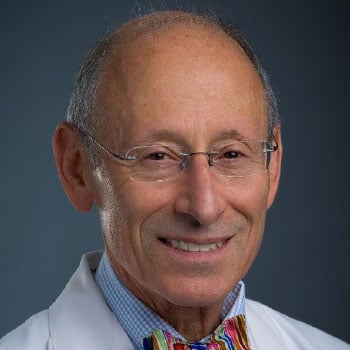January 2022 member spotlight
Jack Hasson, MD
Past president, Jefferson County Medical Society
Member, Medical Association of the State of Alabama (MASA)
State liaison, Senior Physicians Section, Birmingham, Alabama
Specialty: Pulmonary disease
Dr. Hasson writes: "Presently, and for the past 11 years, I have worked as a pulmonologist at UAB in an academic outpatient setting. Prior to this, I was in a private practice in pulmonary and critical care medicine for 33 years in Birmingham, Al. I felt that the step down to outpatient medicine was perfect at this point in my life.
I still enjoy the practice of medicine without the stressors of inpatient care, and I enjoy seeing patients in the outpatient setting. I am able to spend more time with patients that was not allowed in my previous setting. I also enjoy my teaching role with the pulmonary fellows."
Q: How can senior physicians help during COVID-19, especially if doctors are retired and want to return to work to work during this time?
A: The challenge of COVID-19 has been very real even in the clinical setting. Having to deal with patients who have complications, including chronic pneumonia, that requires months of treatment has been challenging. It is fortunate that there are therapies for these problems that can bring many patients back to full function.
Getting patients through the stressors of caring for those with this particular illness has been more challenging than most infectious problems I've had to deal with in the past. Many times, it takes a coordinated effort with other members of the medical team to guide patients through this difficult time in their life. Having colleagues to relate to through this stressful time has made it much easier to handle the stress generated by the onslaught of a large group of these patients.
Q: As a physician leader, why is physician advocacy important to you? How can physicians have a significant impact outside the practice of medicine?
I'm active in Medical Association of the State of Alabama and as a liaison to the AMA’s Senior Physicians Section for my state. In the past, I was very active with the Jefferson County Medical Society serving as its president, and I continue to be active in MASA.
On a personal note, I've been a runner since the age of 18. In the past, I ran marathons; however, I am only doing half marathons now. Running has been a marvelous release of stress and has always been an enjoyment for me. My other hobby is watercolor art, and I am a member of the Watercolor Society of Alabama, and try to participate in two exhibits each year.
For the past 11 years, I've enjoyed what I call semi-retirement, seeing patients in clinic and balancing my work with my hobbies and outside activities with family and friends. It is apparent to me at this point that all physicians should plan ahead for the inevitable point in time when adjustments have to be made with the work environment, especially if they wish to continue in the practice of medicine.
Even if one retires from the practice of medicine, there are many options to keep active in the medical community, and I encourage everyone to do that, since as a physician, it's important to continue to have your voice heard at any age.
Q: What are three lessons you have learned through this pandemic?
- Never give up on unvaccinated patients. I found that most patients have been confused by misinformation, and when they tell me they had chosen not to be vaccinated, I respectfully have a discussion with them about their concerns. I let them know that the side effects are minimal and far less than the complications I see every day related to infection with COVID-19 with hospitalizations and deaths. I try to answer their concerns, and when most patients leave the office, they go to the clinic area to receive the vaccination. It is obvious that the patient doctor discussions trump bad information that patients receive.
- It is not over until it's truly over. I don't promise or suggest I know the end of the COVID pandemic. I stressed that there will be peaks and valleys of endemic bursts in the future, and this possibly will be regional. In my opinion, it follows the pattern of COVID infections we've seen in the past (the common cold), which is always with us and occurs at various times during the year in various regions of our nation. Thus, I stress that masks and social distancing may come and go depending on events that we cannot control.
- We can protect ourselves from airborne infectious diseases by lessons learned in this pandemic. Mask protection, social distancing, and paying attention to peaks of infection in our region, can minimize our population from becoming sick from these diseases in the future.
Contact us
Have information about SPS members doing great work? Email us at [email protected].




